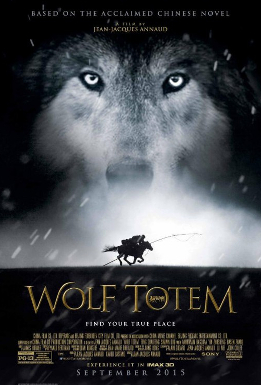The story of a man trying to domesticate a wolf is one that has been told many times on the big screen. Still, I was excited to see Wolf Totem's take on the trope since it is set in the rare environs of Mongolia during China's Cultural Revolution in the late 1960s. By setting it in a time when China was on the cusp of change, Wolf Totem had many themes available to it.
The plot revolves around Chen Zen, a Beijing student sent by the government to a small village in Mongolia to learn their lifestyle and teach the nomads how to read and write Mandarin. In a time when China is quickly modernizing, Chen Zen and the rest of the villagers are pulled between two worlds as they try to navigate modern policies with their centuries-old traditions. Chen Zen becomes obsessed with the wolves that seem to live in tenuous agreement with the nomads and even goes so far as to steal a wolf pup to raise it as his own.
Unfortunately, as much as Wolf Totem tries to be emotionally compelling, it lacked any real punch. In trying to be as poignant as possible, the film covers too much ground, and my emotional investment was spread too thin between too many relationships and themes. Between Chen Zen, his "little wolf", the wild wolf pack, the fatherly leader of the villagers, the alluring woman villager, the local magistrate representing modernity, and the landscape itself, I was left burned out.
Chen Zen himself is a weak central character. His youth and privileged, educated upbringing seem to be his star traits. Clearly, domesticating a wolf is a terrible idea, and he often ignores the advice of the villagers, often landing him in bad situations that put the villagers at risk. Plus, seriously, domesticating a wolf is a TERRIBLE. IDEA.
I was also irked by the way they portrayed the wolves. While I appreciated that they were equals in the eyes of the villagers, I don't know if I believe wolves are as intelligent or emotional as they are portrayed in the film. Not only are they openly vengeful but also on more than one occasion they seem to kill for sport. While that is a behavior found in the wild (called surplus killing), it's generally only done to preserve food for later consumption. However, in the film it is an emotional act to get revenge on humans. There is even a lingering close-up of the alpha male after a particularly devastating act (complete with dramatic music). The shot is reminiscent of evil super villains and had me openly laughing in the theater.
That said the film is beautifully shot. The wide, richly colored shots of Mongolia are stunning to behold and reveal a side of China not often seen on screen. While the soundtrack generally erred on the side of melodramatic, the visuals are almost certainly deserving of such drama. Overall, I was left disappointed with Wolf Totem for missing the mark emotionally but I appreciated Annaud's audacious effort.

